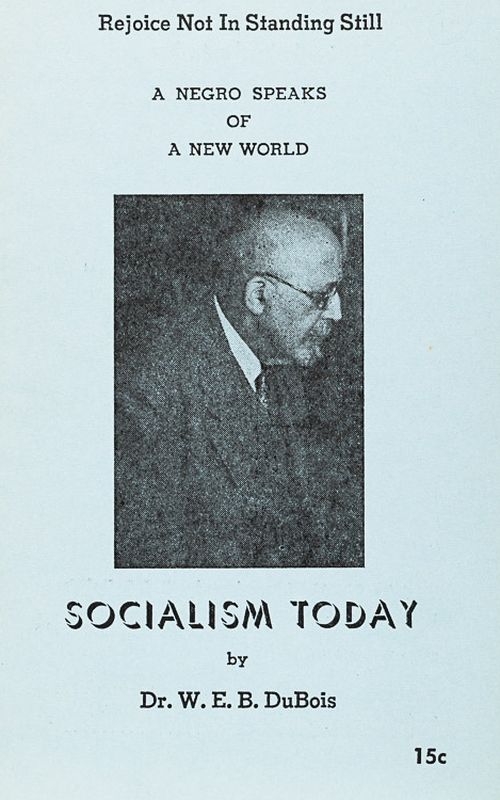Du Bois, Socialism Today / Rejoice Not in Standing Still - A Negro speaks of th
Socialism Today / Rejoice Not in Standing Still – A Negro speaks of the World.
First Edition. Chicago, Afram Books / Afro-American Heritage Association, [c. 1960]. Octavo. 12 pages (including printed wrappers). Portrait-Photograph of William Du Bois on cover. Original Softcover wrappers in Mylar. Excellent condition with some minor signs of wear only. Extremely rare ! According to a foreword by Ishmael Flory “this is a first printed pamphlet issued by Afram Books”. Includes a short Bibliography of Du Bois’ publications, starting with mentioning his first article in Harvard Historical Studies in 1896 “The Suppression of the African Slave Trade to the United States of America” to “Mansart’s World of Color” in 1960. It also lists “other EQUALITY Pamphlets by W.E.B.DuBois like “The Damnation of Women – Predictions on Fatherless and Dependenet Children”.
William Edward Burghardt Du Bois ( February 23, 1868 – August 27, 1963) was an American sociologist, socialist, historian, civil rights activist, Pan-Africanist, author, writer and editor. Born in Great Barrington, Massachusetts, Du Bois grew up in a relatively tolerant and integrated community, and after completing graduate work at the University of Berlin and Harvard, where he was the first African American to earn a doctorate, he became a professor of history, sociology and economics at Atlanta University. Du Bois was one of the founders of the National Association for the Advancement of Colored People (NAACP) in 1909.
Earlier, Du Bois had risen to national prominence as a leader of the Niagara Movement, a group of African-American activists who wanted equal rights for blacks. Du Bois and his supporters opposed the Atlanta compromise, an agreement crafted by Booker T. Washington which provided that Southern blacks would work and submit to white political rule, while Southern whites guaranteed that blacks would receive basic educational and economic opportunities. Instead, Du Bois insisted on full civil rights and increased political representation, which he believed would be brought about by the African-American intellectual elite. He referred to this group as the Talented Tenth, a concept under the umbrella of racial uplift, and believed that African Americans needed the chances for advanced education to develop its leadership.
Racism was the main target of Du Bois’s polemics, and he strongly protested against lynching, Jim Crow laws, and discrimination in education and employment. His cause included people of color everywhere, particularly Africans and Asians in colonies. He was a proponent of Pan-Africanism and helped organize several Pan-African Congresses to fight for the independence of African colonies from European powers. Du Bois made several trips to Europe, Africa and Asia. After World War I, he surveyed the experiences of American black soldiers in France and documented widespread prejudice and racism in the United States military.
Du Bois was a prolific author. His collection of essays, The Souls of Black Folk, is a seminal work in African-American literature; and his 1935 magnum opus, Black Reconstruction in America, challenged the prevailing orthodoxy that blacks were responsible for the failures of the Reconstruction Era. Borrowing a phrase from Frederick Douglass, he popularized the use of the term color line to represent the injustice of the separate but equal doctrine prevalent in American social and political life. He opens The Souls of Black Folk with the central thesis of much of his life’s work: “The problem of the twentieth century is the problem of the color-line.″
His 1940 autobiography Dusk of Dawn is regarded in part as one of the first scientific treatises in the field of American sociology, and he published two other life stories, all three containing essays on sociology, politics and history. In his role as editor of the NAACP’s journal The Crisis, he published many influential pieces. Du Bois believed that capitalism was a primary cause of racism, and he was generally sympathetic to socialist causes throughout his life. He was an ardent peace activist and advocated nuclear disarmament. The United States Civil Rights Act, embodying many of the reforms for which Du Bois had campaigned his entire life, was enacted a year after his death. (Wikipedia)
- Keywords: Afro-Amerian History · Afro-American Culture · Afro-Americans · American History – Rare · Black Culture · Black History · Sociology – Rare · Sociology of Culture
- Language: English
- Inventory Number: 29713AB
EUR 160,--
© 2025 Inanna Rare Books Ltd. | Powered by HESCOM-Software










